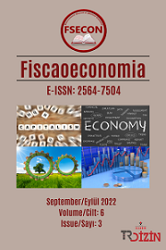Türkiye’de Vergi Uyumu ve Mekansal Farklılıklar, 2013-2020
Tax Compliance and Spatial Differences in Turkey, 2013-2020
Author(s): Fırat GündemSubject(s): National Economy, Present Times (2010 - today), Public Finances, Fiscal Politics / Budgeting
Published by: Ahmet Arif Eren
Keywords: Tax Compliance; Spatial Regimes; Tax Collection; Tax Assessment; Tax Penalties;
Summary/Abstract: Tax compliance is a term that refers to the capacity of the government in order to collect taxes without too much effort. Also, tax compliance shows the level of willingness of individuals and companies to pay their taxes without seeking systemic gaps in the tax system. Tax compliance is especially important for developing countries to find resources to fulfill public expenditures. That is why it is affected by various factors such as age, education, trust for the incumbent, foreign trade, etc. However, the tax compliance of the various spatial units is not the same. This is very important, especially when the economic activities of the citizens and companies and the taxes that they are subjected to pay are specified and collected at the local levels. There might be various spatial tendencies in terms of tax compliance and it is very important to know them at the spatial level for the government. In that context, in this study, the factors that have been affected by the spatial units for tax compliance are investigated at the province level. Findings show that tax compliance is affected by demographic variables and penalties. However, penalties impact tax compliance negatively in Turkey. Also, tax compliance is not the same nationwide and there are various spatial regimes based on the ratio between tax collecting and tax assessment.
Journal: Fiscaoeconomia
- Issue Year: 6/2022
- Issue No: 3
- Page Range: 1433-1456
- Page Count: 24
- Language: Turkish

